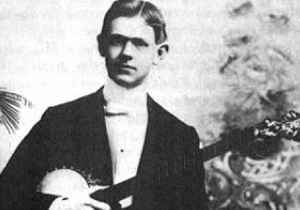


Fred Van Eps
Circa 1910
Source: Record Fiend
So everybody thinks that Bela Fleck is the defining bag of marbles in banjo for the last three decades. But Mr. Fleck took his time being born, ninety years after Vess Ossman in 1868, and eighty behind Fred Van Eps born to a watchmaker on 30 December 1878 in Somerville, New Jersey. Fred Van Eps was father to jazz guitarist, George Van Eps, born in 1913. Fred would also make banjos, he and Henry Burr to produce the Van Eps Recording Banjo in the twenties. As in Van Ep's day, cat gut, or that of other animals, is yet preferred in the manufacture of stringed instruments, though strings of other synthetic material have been tried. Maple is the wood most commonly preferred, though mahogany and walnut are used as well.
Van Eps first recorded banjo in 1897, that at home on wax cylinder blanks. He is thought to have been hired the same year to scratch cylinders for Thomas Edison's National Phonograph Company as a studio musician. Rag Piano [refs below] commences its list of name recordings for Edison on cylinder in 1901 w 'The Sunflower Dance' (Edison Gold 7881) and 'Concert Waltz' (Edison Gold 7888). Multiple sources don't have those released until 1907 and 1911 respectively.
Possibly released in 1902 were 'Patrol Comique' (Edison Gold 2627) and 'The International Cakewalk' (Edison Gold 8236). The UCSB Cylinder Audio Archive has 'L'enfante March' (Edison Gold 8274) issued in 1902. 'Blaze Away' that year was among his most popular releases. 'Maple Leaf Rag' below is the golden ragtime classic written by Scott Joplin in 1899.
'International Cake Walk' Banjo by Fred Van Eps
Edison Gold cylinder 8236 Possibly 1902
Synced w silent film of 1903
'L' Enfante March' Banjo by Fred Van Eps
Edison Gold cylinder 8274 Possibly 1902
Composition: George Gregory
'Dixie Medley' Banjo by Fred Van Eps
Edison Gold cylinder 8274 Possibly 1903
'Darkies Dream' Banjo by Fred Van Eps
Indestructible cylinder 653 1907
'Irish Hearts' Banjo by Fred Van Eps
Indestructible cylinder 653 1908
Composition: Everett Evans / Henry Frantzen
'Maple Leaf Rag' Banjo by Fred Van Eps
Indestructible cylinder 823 1909
Composition: Scott Joplin 1899
Van Eps had recorded his first issues on disc for Columbia. He had first scratched 'Jack Tar' on cylinder for Columbia in 1903 for issue in 1904 on Columbia XP 32324. He also recorded that on disc for issue in January 1904 on Columbia 1613. Van Eps was also a bridge from ragtime to jazz. The first jazz-relevant title listed in Tom Lord's sessionography is 'Chatterbox Rag' gone down in New York circa 1910 toward issue on Zonophone 5828. Lord traces Van Eps to as far as 1 November 1939 on such as 'Somewhere a Voice is Calling' with Jack Teagarden issued on Columbia 35450.
'Chatterbox Rag' Banjo by Fred Van Eps
Zonophone 5828 Circa 1910
Van Eps issued prolifically on Victor as well during the first decade of the 20th century, 'Rag Picking' and 'Burglar Buck' among his first titles on that label in 1911. In 1912 he began recording with his Van Eps Trio, continuing so until 1922.
'A Ragtime Episode' Banjo by Fred Van Eps
Recorded 31 Jan 1911 in Camden NJ Victor 9877 / 16845
Composition: Paul Eno
'Dance of the Bugs' Banjo by Fred Van Eps
Recorded 19 Dec 1911 in Camden NJ Issued 1915 on Victor 17834-B
Composition: Will H. Dixon
'Notoriety Rag' Van Eps Trio
Piano: Felix Arndt Drums: Eddie King
Recorded 19 March 1914 in NYC Issued on Victor 17601
(No reference to this in 1913 can be found)
Composition: Kathryn Widmer
'Down Home Rag' Van Eps Trio
Recorded Aug 1914 Issued on Edison Blue Amberol cylinder 2377
Composition: Wilber Sweatman
Van Eps' 'Daly's Reel' is a medley of American reels, a dance style originating in Scotland by at least 1590. It arrived to Ireland a couple centuries later, to America probably in the 19th century to become a standard form in country square dance.
'Daly's Reel' Banjo by Fred Van Eps
Recorded 1 June 1916 in Camden NJ Issued on Victor 18116-A
Composition: Joe M. Daly
The four-wheel drive Willys Jeep didn't see production until 1941, so getting around on wheels in the early 20th century could be a challenge. Roads and their conditions were left to individual states and localities until the Federal Aid Road Act of 1916, the first major move by the federal government to improve highways and rural roads, matching up to 6% of state expenses on improvements.
'On the Dixie Highway' Banjo by Fred Van Eps
Recorded 20 Dec 1916 in NYC Issued on Victor 18860
Composition: Leo Friedman
In 1921 Van Eps and partners featured in the short film by the Kellum Talking Picture Company, 'The Famous Van Eps Trio in a Bit of Jazz' [IMDb]. Having also worked the vaudeville circuit in the thirties, Van Eps traded banjo for guitar as he began doing studio work for such as Benny Goodman, Ray Noble and Red Norvo. He switched back to recording banjo in 1950, releasing such into 1956 on his own record label, 5 String Banjo.
Six tracks recorded 1952 Banjo by Fred Van Eps Including Lou Green interview in 1962
Said that he could play fourteen notes in one second, Van Eps died on 22 Nov 1960 in Burbank, California.
Sources & References for Fred Van Eps:
Bill Edwards (Rag Piano)
VF History (notes)
Audio: cylinders c 1902-1926: Edison / Indestructible / U.S. Everlasting: UCSB
Iconography: Wikimedia Commons
Popularity Charts: Music VF
Recordings: Cats / Discos:
45 Worlds Discogs Music Brainz RYM
Recordings: Sessionographies:
DAHR (flat shellac)
Tom Lord: leading 26 of 79 jazz-relevant sessions
Edison / Columbia / Victor / Indestructible / U.S. Everlasting / Pathe / Emerson / Okeh: Rag Piano
Further Reading:
Ragtime Music:
Top-selling recordings 1890-1899: Dave's Music Database
Classical Main Menu Modern Recording
|
|
hmrproject (at) aol (dot) com